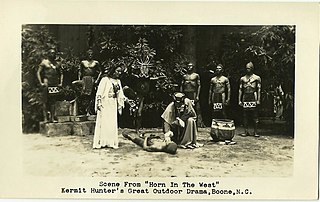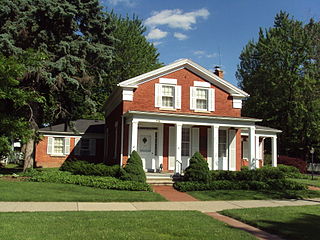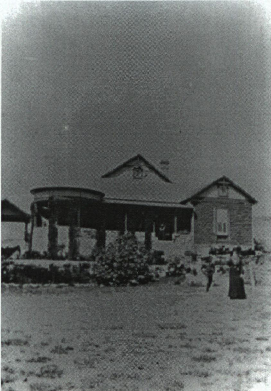
Boone is a town in and the county seat of Watauga County, North Carolina, United States. Located in the Blue Ridge Mountains of western North Carolina, Boone is the home of Appalachian State University and the headquarters of the disaster and medical relief organization Samaritan's Purse. The population was 19,092 at the 2020 census.

Watauga County is a county located in the U.S. state of North Carolina. The population was 54,086 at the 2020 census. Its county seat and largest community is Boone. The county is in an exceptionally mountainous region, known as the High Country. It is the home of Appalachian State University, which has approximately 21,570 students as of Fall 2024. Watauga County comprises the Boone, NC Micropolitan Statistical Area.

Elizabethton is a city in, and the county seat of Carter County, Tennessee, United States. Elizabethton is the historical site of the first independent American government located west of both the Eastern Continental Divide and the original Thirteen Colonies.

Blowing Rock is a town in Watauga and Caldwell counties in the U.S. state of North Carolina. The population was 1,397 at the 2021 census.

Appalachian State University, or App State, is a public university in Boone, North Carolina, United States. It was founded as a teachers' college in 1899 by brothers B. B. and D. D. Dougherty and the latter's wife, Lillie Shull Dougherty. The university expanded to include other programs in 1967 and joined the University of North Carolina System in 1971.

Boone Hall Plantation is a historic district located in Mount Pleasant, Charleston County, South Carolina, United States and listed on the National Register of Historic Places. The plantation is one of America's oldest plantations still in operation, as it has continually produced agricultural crops for over 320 years. The majority of this labor, as well as the construction of the buildings and its characteristic bricks, was performed by enslaved African Americans, aside from the main building, which was built in 1936. For this reason, the site was named one of the African American Historic Places in South Carolina in 2009. The historic district includes a 1936 Colonial Revival-style dwelling, and multiple significant landscape features, including an allée of southern live oak trees, believed to have been planted in 1743. The site is open for public tours.

Horn in the West, written by playwright Kermit Hunter, is an outdoor drama produced every summer since 1952 in the Daniel Boone Amphitheater in Boone, North Carolina. The show, the oldest revolutionary war drama in the United States, was about the life and times of the hardy mountain settlers of western North Carolina and eastern Tennessee. It covers a time period during the American Revolution between the Battle of Alamance in 1771 and the Battle of King's Mountain in 1780. The story follows the family of Dr. Geoffrey Stuart, a British loyalist, who is forced to flee the lower colony due to the actions of his son during the Battle of Alamance. Led into the mountain country by frontiersman Daniel Boone, Stuart must come to terms with his own loyalties, which are divided between his country and his son.

The Bateman Hotel, previously known as Howell Hotel or Kellogg Hotel, located in Lowville, New York, is now a conglomerate of condos. At one time, it was a hotel with a kitchen, a dining room, and a saloon. The hotel is listed in the National Register of Historic Places.

The Sycamore Shoals of the Watauga River, usually shortened to Sycamore Shoals, is a rocky stretch of river rapids along the Watauga River in Elizabethton, Tennessee. Archeological excavations have found Native Americans lived near the shoals since prehistoric times, and Cherokees gathered there. As Europeans began settling the Trans-Appalachian frontier, the shoals proved strategic militarily, as well as shaped the economies of Tennessee and Kentucky. Today, the shoals are protected as a National Historic Landmark and are maintained as part of Sycamore Shoals State Historic Park.

Sycamore Shoals State Historic Park is a state park located in Elizabethton, in the U.S. state of Tennessee. The park consists of 70 acres (28.3 ha) situated along the Sycamore Shoals of the Watauga River, a National Historic Landmark where a series of events critical to the establishment of the states of Tennessee and Kentucky, and the settlement of the Trans-Appalachian frontier in general, took place. Along with the historic shoals, the park includes a visitor center and museum, the reconstructed Fort Watauga, the Carter House and Sabine Hill . For over a thousand years before the arrival of European explorers, Sycamore Shoals and adjacent lands had been inhabited by Native Americans. The first permanent European settlers arrived in 1770, and established the Watauga Association—one of the first written constitutional governments west of the Appalachian Mountains—in 1772. Richard Henderson and Daniel Boone negotiated the Treaty of Sycamore Shoals in 1775, which saw the sale of millions of acres of Cherokee lands in Kentucky and Tennessee and led to the building of the Wilderness Road. During the American Revolution, Sycamore Shoals was both the site of Fort Watauga, where part of a Cherokee invasion was thwarted in 1776, and the mustering ground for the Overmountain Men in 1780.

The Hermitage Hotel, is a historic hotel located at 231 6th Avenue North in Nashville, Tennessee. Commissioned by 250 Nashville residents in 1908 and named for Andrew Jackson's estate, The Hermitage near Nashville, the hotel opened in 1910. It was built in the Beaux-arts style and is the only remaining example of this style of architecture in a commercial building in Tennessee.

Boone Tavern is a restaurant, hotel, and guesthouse affiliated with Berea College in Berea, Madison County, Kentucky.

The Rockingham Hotel is a historic former hotel and contemporary condominium at 401 State Street in Portsmouth, New Hampshire, United States. Built in 1885, it is a prominent early example of Colonial Revival architecture, built in part in homage to Woodbury Langdon, whose 1785 home occupied the site. Langdon's home and the hotel both played host to leading figures of their day, and the hotel was one of the finest in northern New England. The hotel, now converted to condominiums, was added to the National Register of Historic Places in 1982.

The Donoho Hotel is a historic hotel in Red Boiling Springs, Tennessee, United States. Built in 1916, the Donoho is one of three hotels remaining from the early-20th century resort boom at Red Boiling Springs, and the last of the great white frame hotels with full-length two-story verandas. Although it has changed ownership several times, the Donoho has remained in operation continuously since its opening. In 1986, the hotel and several outbuildings were added to the National Register of Historic Places as a historic district.

The Governor Charles Croswell House is a building located at 228 North Broad Street in the city of Adrian in Lenawee County, Michigan, United States. It was designated as a Michigan State Historic Site on February 19, 1958 and later listed on the National Register of Historic Places on March 16, 1972. It is located very close to but is not part of the Downtown Adrian Commercial Historic District.

The Bauer Manor, also known as the Davenport House or Davenport Hotel, is a hotel located at 1280 U.S. Route 12 near the unincorporated community of Tipton in Franklin Township in northern Lenawee County, Michigan. It was designated as a Michigan State Historic State on May 18, 1971 and listed on the National Register of Historic Places on May 4, 2007.

The Chieftain Hotel is a historic former hotel building at 38 Pearl Street in Council Bluffs, Iowa, United States. It opened in 1927, the result of a partnership between the Eppley Hotel Company and local patrons, and was built on the site of the Grand Hotel, which had opened in 1891 and was destroyed by a fire in 1925. The hotel was eight stories tall, and featured 153 guest rooms.

The Henry M. and Annie V. Trueheart House is a residence of historic significance located in the town of Fort Davis, the seat and largest town of Jeff Davis County in the U.S. state of Texas. The house was built in 1898 and, along with the surrounding property, was added to the National Register of Historic Places (NRHP) in 1996. The Trueheart House has also been distinguished as a Recorded Texas Historic Landmark (RTHL) since 1964.

The Darling Inn is a historic former hotel building in the center of Lyndonville, Vermont. Built in 1927–28, it is a rare example in the state of an architecturally neo-Federal building, and one of the last major constructions during the state's Colonial Revival period. Now converted to a senior care facility, it was listed on the National Register of Historic Places in 1980.

The St. Clair Inn is a hotel located at 500 North Riverside Avenue in St. Clair, Michigan. It was listed on the National Register of Historic Places in 1995.
























